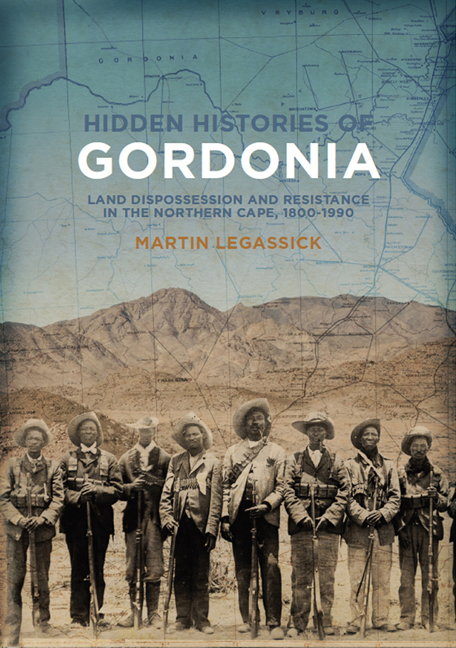Book contents
- Frontmatter
- Dedication
- Contents
- Acknowledgements
- Acronyms and abbreviations
- Illustrations
- Preface
- Chapter 1 The prehistory of Gordonia
- Chapter 2 The Baster settlement of Gordonia and its decline
- Chapter 3 The will of Abraham and Elizabeth September: a struggle for land in Gordonia, 1898–2014
- Chapter 4 From prisoners to exhibits: representations of Bushmen of the northern Cape, 1880–1900
- Chapter 5 South African human remains and the politics of repatriation: reconsidering the legacy of Rudolf Pöch
- Chapter 6 The early history of the brown Afrikaners in Riemvasmaak
- Chapter 7 The battle of Naroegas
- Chapter 8 The Marengo rebellion and Riemvasmaak, 1903–1907
- Chapter 9 The racial division of Gordonia, 1921–1930
- Chapter 10 Keidebees and Blikkies locations, Upington, 1894–1974
- Chapter 11 ‘All my powers have been swallowed by Upington’: the life and times of Alfred Gubula
- References
- Index
- Frontmatter
- Dedication
- Contents
- Acknowledgements
- Acronyms and abbreviations
- Illustrations
- Preface
- Chapter 1 The prehistory of Gordonia
- Chapter 2 The Baster settlement of Gordonia and its decline
- Chapter 3 The will of Abraham and Elizabeth September: a struggle for land in Gordonia, 1898–2014
- Chapter 4 From prisoners to exhibits: representations of Bushmen of the northern Cape, 1880–1900
- Chapter 5 South African human remains and the politics of repatriation: reconsidering the legacy of Rudolf Pöch
- Chapter 6 The early history of the brown Afrikaners in Riemvasmaak
- Chapter 7 The battle of Naroegas
- Chapter 8 The Marengo rebellion and Riemvasmaak, 1903–1907
- Chapter 9 The racial division of Gordonia, 1921–1930
- Chapter 10 Keidebees and Blikkies locations, Upington, 1894–1974
- Chapter 11 ‘All my powers have been swallowed by Upington’: the life and times of Alfred Gubula
- References
- Index
Summary
This book is a series of essays on the 19th- and 20th-century history of what was at the time called Gordonia (now essentially the Z.W. Mgcawu district of the Northern Cape Province, together with parts of the Kgalagadi Transfrontier Park). The region surrounding Gordonia – the northern part of this province – though a large land area, is marginal in South Africa. Some reports on this region estimate it as containing only 2.2 per cent of South Africa's population in 2014, and the lowest growth rate in the country of 2.2 per cent in 2011.
Gordonia is a part of central Transorangia, which may be defined as ‘the region to the north of the middle Orange River mainly comprising Griqualand West and what was once called British Bechuanaland’. Gordonia proper lies north of the Orange, between Groblershoop and the Aughrabies Falls. To its west is Namaqualand – ‘the mountainous and rugged granite terrain along the escarpment south of the lower Orange… [comprising] Little Namaqualand; the area extending from the Orange River to Rehoboth in the north and from the great escarpment to the Kalahari sands… [comprising] Great Namaqualand’. To the south of Gordonia is Bushmanland, which lies to the east of Little Namaqualand and shades away to the west into the Great Karoo. The Orange River cuts its way between the arid semi-desert of Gordonia to the north and Bushmanland to the south. The river valley is an elongated fertile oasis, the only historical source of permanent water and excellent grazing pasture, with rainfall progressively lessening to the river's mouth. Between Upington and the Aughrabies Falls the valley widens out (variably between one and 11 kilometres wide) into an 80-kilometre long chain of islands, big and small.
From late October until May, when summer rains fall, the Orange River is generally in flood, though for the remainder of the year its bed is dry. When the river is in flood, the islands are ‘intersected by innumerable streams, almost all unfordable, and many of them swift as mill races’. Leading a military expedition against the Kora on the islands in 1869, Sir Walter Currie commented that he ‘used to think the Fish River bush [on the eastern Cape frontier] a stronghold, but it stands nowhere in comparison with this water jungle’.
- Type
- Chapter
- Information
- Hidden Histories of GordoniaLand dispossession and resistance in the Northern Cape, 1800–1990, pp. xvii - xxviPublisher: Wits University PressPrint publication year: 2016



